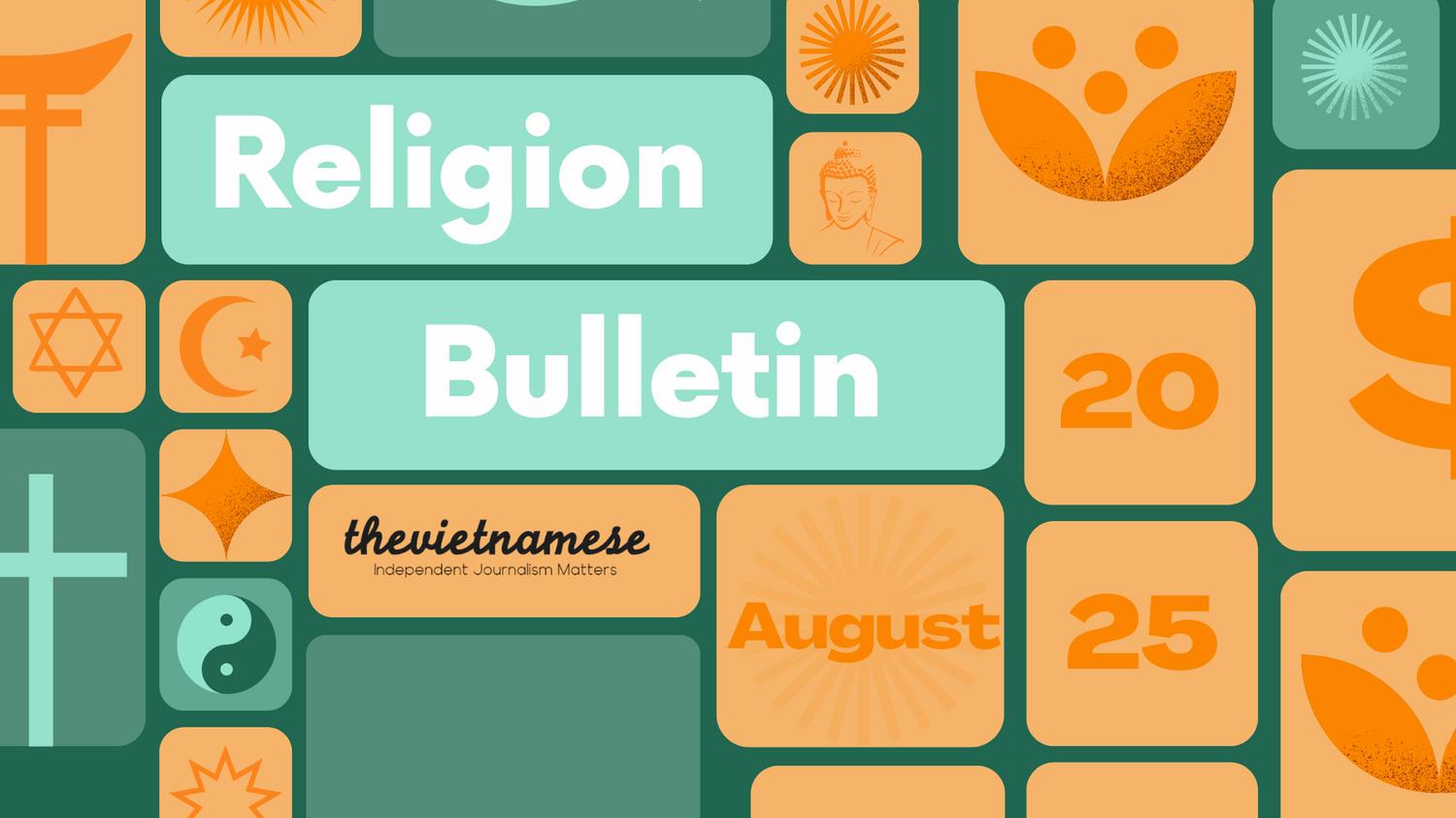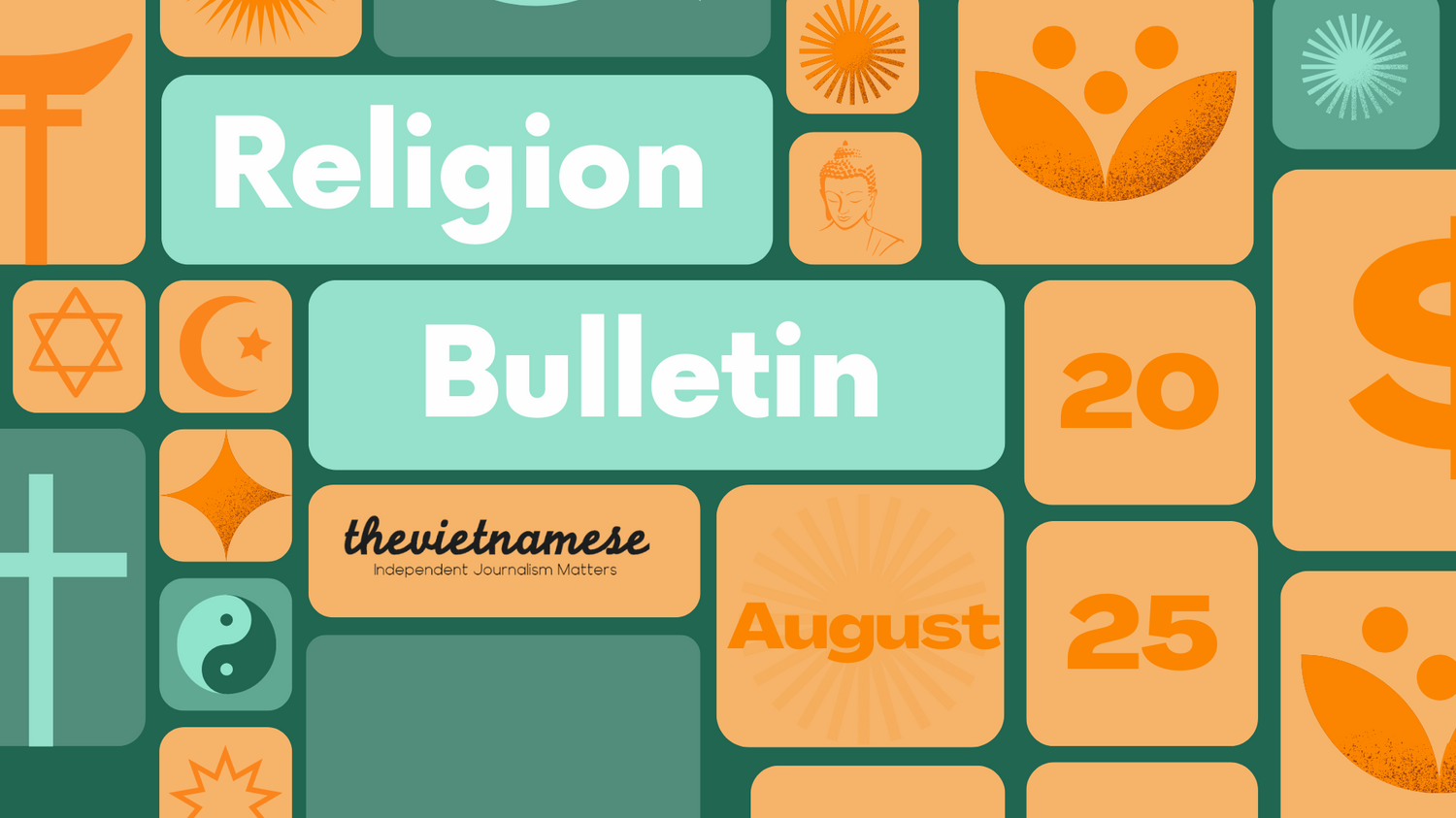Notable religious events in August 2025:
- Catholic Community in Thái Nguyên Province Faces Restrictions on Worship;
- Authorities in Lào Cai Province Prevent Religious Groups from Evangelizing;
- Faith on the Rise, but State Recognition Still Limited in Việt Nam;
- Authorities Outline Rules for Unrecognized Protestant Communities;
- UN Human Rights Office Warns of Escalating Repression Against Khmer Krom Buddhists in Việt Nam.
Restrictions Imposed on Catholic Worship in Thái Nguyên

On Aug. 11, 2025, the Diocese of Bắc Ninh reported that the authorities of Thái Nguyên Province had prevented Catholics from practicing religious activities at a church in Thuận Phong, which belongs to Đại Từ Parish under the Diocese of Bắc Ninh.
Specifically, the authorities cut off electricity across the entire Thuận Phong while parishioners were celebrating Mass.
A video shows the mass taking place in darkness, illuminated only by candles on the altar and the light from parishioners’ mobile phones.
According to information obtained by Luật Khoa Magazine reporters, the authorities acted to restrict religious practice at Thuận Phong on the grounds that this worship site had not been officially licensed for religious activities. However, according to parishioners, this has been a regular mass site, serving the elderly and children living far away who cannot travel to the Đại Từ Church.
The Diocese of Bắc Ninh also reported that on July 16, 2025, provincial officials—including the deputy director of the Department of Ethnic and Religious Affairs, the head of the Office for Religious Security, the Party secretary of Đại Từ Commune, along with other local and provincial representatives—visited Đại Từ Parish to investigate the incident.
At the meeting, the authorities admitted that the actions taken were spontaneous, lacking dialogue and sensitivity from lower-level officials. They also pledged to learn from the incident and promised it would not be repeated at Thuận Phong.
This is not the first time authorities have obstructed Catholics from celebrating mass. In March 2023, local officials in Đăk Nông Commune, Ngọc Hồi District, Kon Tum Province, forcibly stopped Father Francis Xavier Lê Tiên, pastor of Đăk Giấc Parish, while he was conducting mass at the chapel of St. Paul community.
Earlier, in February 2022, while Archbishop Joseph Vũ Văn Thiên was celebrating mass at Vụ Bản Parish Church, two officials—identified as Phạm Hồng Đức, party secretary of Vụ Bản Town, and Phạm Văn Chiến, deputy chairman of the Vụ Bản Town People’s Committee in Hòa Bình Province—suddenly appeared and demanded that the Mass be stopped.
Compared to other religions in Việt Nam, Catholicism has beenregarded as relatively fortunate for not being subjected to direct state control.
However, Catholic activities in remote areas far from major cities still face significant obstacles, as the authorities frequently refuse to recognize newly established churches and chapels. All religious activities must receive government approval before being held, even when they are purely religious and conducted by domestic clergy.
Lào Cai Authorities Crack Down on Falun Gong and Almighty God Church Evangelism
On July 27, 2025, authorities in Lào Cai Province stopped a follower from distributing Falun Gong materials in Mường Khương Commune.
Officials confiscated 64 books, numerous loose documents, two handheld radios, and seven keychains related to Falun Gong.
Also in Lào Cai, on Aug. 17, 2025, authorities blocked another follower who was distributing leaflets and other Falun Gong materials in Lào Cai Ward.
In addition, the authorities reiterated their stance that Falun Gong teachings and practices are “unscientific, superstitious,” and detrimental to social order and public life.
Beyond Lào Cai, northern mountainous provinces have also regularly cracked down on Falun Gong evangelism.
In May 2024, authorities in Yên Bái Province stopped Falun Gong adherents from distributing the group’s literature in Mậu A Town, Văn Yên District.
Similarly, in December 2024, officials in Thái Nguyên Province banned followers from proselytizing and distributing Falun Gong materials in Thái Nguyên City, confiscating books, keychains, calendars, and other items linked to the movement.
To date, the authorities have consistently maintained that Falun Gong is neither a belief system nor a religion, and have refused to recognize it in Việt Nam.
On Aug. 25, 2025, in Lao Cai, the authorities summoned a follower of the Almighty God Church (Hội thánh Đức Chúa Trời Toàn Năng) for questioning after discovering that he had been using Facebook to proselytize.
Officials further declared that the Almighty God Church is an “evil cult,” labeling it a reactionary organization allegedly linked to incidents of violence, extortion, kidnapping, and murder.
These actions reflect the government’s continued view of Falun Gong and the Almighty God Church as “heretical sects” and its ongoing suppression of followers of these groups.
Việt Nam Reports Growth in Religious Adherents and Recognized Groups
According to the official website of the Communist Party of Việt Nam, 95% of the population currently follow some form of belief. Among them, 27.7 million adherents belong to 43 organizations representing 16 state-recognized religions.
In March 2023, the government’s White Paper “Religion and Religious Policy in Việt Nam” reported that the country had about 26.5 million religious followers and 36 organizations representing 16 recognized religions.
This means that over the past two years, the number of religious adherents in Việt Nam has increased by 1.2 million, with seven additional religious organizations gaining official recognition.
Earlier government statistics also noted the existence of 85 “strange” or unrecognized faiths, along with approximately 140 unregistered religious groups with an estimated 1 million followers.
In May 2023, the U.S. State Department’s 2022 International Religious Freedom Report stated that the Vietnamese government had not recognized any new religious groups for four consecutive years. This stood in contrast to an earlier claim by Deputy Minister of Home Affairs Vũ Chiến Thắng, who had declared that Việt Nam would welcome all religions, including newly emerging ones.
The government’s recognition of seven additional religious organizations since 2023 may therefore reflect international pressure influencing the state of religious freedom in Việt Nam.
Authorities Outline Rules for Unrecognized Protestant Communities
On Aug. 13, 2025, the Government Committee for Religious Affairs organized a conference in Hải Phòng City to provide legal guidance for Protestant religious activities in accordance with state regulations.
Participants included leaders of Protestant house churches and groups in northern Việt Nam that have not yet been officially recognized by the state.
The purpose of the conference was to provide legal knowledge, instruct on conducting religious activities within the framework of the law, and encourage cooperation and compliance among Protestant groups still lacking official recognition.
This move highlights the rapid growth of Protestantism in northern Việt Nam.
A 2022 report by Xây dựng Đảng magazine noted that out of 1.2 million Protestants nationwide, as many as 873,700—or 73%—belonged to ethnic minority communities. Of these, 238,900 resided in northern mountainous provinces. Authorities themselves have previously acknowledged the fast-paced expansion of Protestantism in this region.
The northern region has also witnessed the emergence of new religious movements such as Bà Cô Dợ, Giê-Sùa, Dương Văn Mình, and the Almighty God Church.
Bà Cô Dợ: A new religious movement in northern Việt Nam blending elements of folk belief and Christianity, often practiced within ethnic minority communities.
Giê-Sùa: A syncretic faith emerging among ethnic minorities in the northern highlands of Việt Nam, centered on worship of a messianic figure interpreted as “Jesus” in local tradition.
Dương Văn Mình: A religious movement founded by H’Mông leader Dương Văn Mình in the 1980s, emphasizing rituals distinct from both traditional H’Mông customs and mainstream Christianity.
Almighty God Church (Hội thánh Đức Chúa Trời Toàn Năng): A Christian-derived sect originating in China in the 1990s, also known as Eastern Lightning, teaching that Christ has returned as a female incarnation.
Although these groups are not recognized, many followers of folk beliefs and Protestants have converted to these faiths.
For example, in 2019, 1,208 Protestants in Điện Biên Province converted to the Giê-Sùa faith.
OHCHR Raises Concerns Over Repression of Khmer Krom Buddhists in Việt Nam
On Aug. 25, 2025, a press release from the Office of the UN High Commissioner for Human Rights (OHCHR) stated that UN experts expressed concern over the Vietnamese government’s ongoing repression of the Khmer Krom people.
Reports indicate that the repression of the Khmer Krom community has been steadily intensifying, targeting human rights defenders, Buddhist monks, and advocates of indigenous cultural and religious rights.
The report also noted that many believers have faced harassment, criminalization, and arrest even when engaging in peaceful religious or spiritual activities.
Among them are prominent monks and activists who have been subjected to unfair trials and given disproportionate sentences.. All of these figures, the statement said, have been subjected to unfair trials and handed disproportionate sentences.
In April 2024, the authorities carried out a violent raid on Đại Thọ Pagoda, an independent Khmer Buddhist temple in Vĩnh Long Province, partially destroying the facility, disrupting Khmer-language classes, and forcing monks to renounce their religious status.
The Khmer Krom community in the Mekong Delta has long faced discrimination, as well as restrictions on their religious practice and cultural and linguistic rights. To this day, those who speak out in defense of these rights are often harassed, arbitrarily detained, or severely punished.

